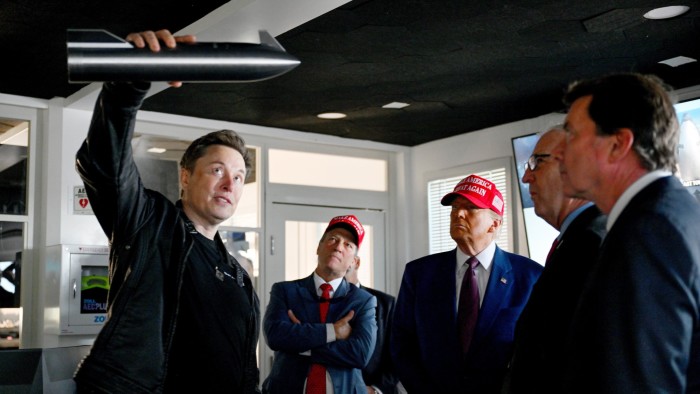Unlock the Editor’s Digest for free
Roula Khalaf, Editor of the FT, selects her favourite stories in this weekly newsletter.
The grin that Elon Musk wore during Donald Trump’s inaugural address widened further when the president pledged that Americans would “plant the stars and stripes on the planet Mars”. Colonising the red planet en route to creating “a spacefaring civilisation” has long been one of Musk’s driving ambitions — and a prime motivation for his building SpaceX into the world’s most successful space company.
Trump is not the first president to proclaim an ambition to land astronauts on Mars but, with dedicated support from the world’s champion rocketeer and richest person, he has a better chance of success than his predecessors. Some might regard spending $1tn establishing a Martian base as hubristic waste when so much needs fixing on our own planet. The proposal, though, is more popular than many of Trump’s other enthusiasms. A YouGov poll in 2023 found 57 per cent of Americans supported sending astronauts to Mars, with only 19 per cent opposed.
Musk has become such a polarising character that his championing a Mars programme may also appear to his detractors a gigantic vanity project. Yet his record with Tesla and SpaceX has demonstrated an exceptional ability to achieve ambitious technological feats. Putting humans on another planet would be hugely inspiring for people not just in the US but worldwide. Remember the wave of enthusiasm for science and technology, particularly among the young, after the Apollo Moon landings.
The US space agency Nasa is focusing the future of human space flight on returning astronauts to the Moon through the Artemis programme started by the previous Trump administration in 2017. The first crewed landing is expected in 2027. In contrast, Musk’s philosophy expressed on X recently is: “We’re going straight to Mars. The Moon is a distraction.”
Musk’s engineering reputation rests in part on his determination to strip out unnecessary steps and drive teams relentlessly towards a final goal. Here, however, a less radical approach might be wiser. For the new administration to cancel key elements of Artemis, such as the Orion crew capsule, would be a waste of about $100bn allocated to the programme by Nasa and partners such as the European Space Agency. Valuable learning that could make Mars missions more achievable would be lost.
Even if Musk’s associate Jared Isaacman, nominated by Trump to lead Nasa, tries to redirect resources from the Moon to Mars, Congress may stop him. Many members of both parties are committed to the Moon-first approach, not least because abandoning it would leave lunar real estate open for China to exploit. Ideally Musk would lend his expertise and the immense power of SpaceX rocketry to make the Moon a successful stepping stone to his goal.
Pioneering travellers to Mars will have to undergo an extremely rigorous selection process, as the nine-month trip to the red planet on Musk’s Starship will place a huge strain on minds and bodies. Even with good shielding, cosmic radiation and extended exposure to low gravity will accelerate ageing of organs from kidneys to the brain. Mental health could suffer from prolonged confinement with fellow astronauts.
Musk famously said a few years ago: “I would like to die on Mars. Just not on impact.” Some of his critics might be happy to see the controversial billionaire leave on the first flight, though it is not clear he would meet the demanding mental and physical requirements for the trip. But he may have the power, wealth and determination to make it happen for others — and, as he sees it, to give humanity a future beyond Earth while inspiring innovation and motivation on Terra Firma along the way.
Read the full article here




